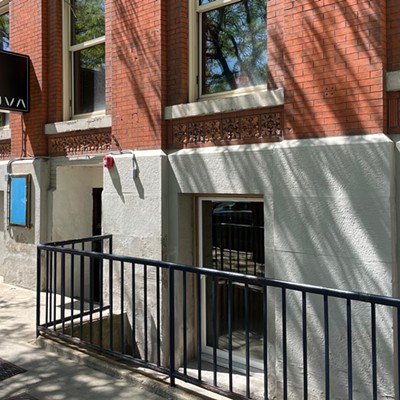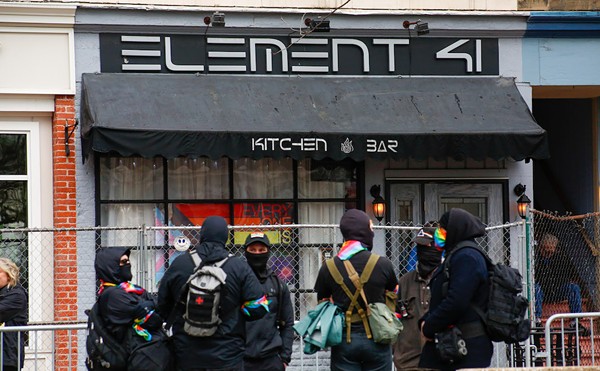
But in light of the Cleveland Catholic Diocese’s recently released “Policy on Issues of Sexuality and Gender Identity,” that relationship is becoming strained in the city. Ristow is the artistic director of Cleveland Chamber Choir and director of Oberlin Conservatory choirs. Although Cleveland Chamber Choir is not religiously affiliated, it performs both secular and religious pieces, often in religious spaces.
“All of us who sing professionally and conduct professionally have certainly regularly performed in Catholic churches, especially because those churches, often just by their architectural traditions, tend to be among the best spaces to hear choral music, really resonant spaces with a reverb that goes on for two to five seconds at a time,” Ristow said.
The new diocesan policy does not recognize the existence of LGBTQ+ individuals, referring to them instead as “experiencing gender dysphoria and/or gender confusion.” For these individuals and anyone trying to support them, vague but ultra-conservative restrictions are in place in all Catholic offices, parishes and schools in the diocese.
Under the policy, individuals’ clothes, hair and conduct must be “consistent with their God-given biological sex”; faculty and staff are required to “out” minors to parents; both medical and social transitioning—including using a person’s referred pronouns and name—are banned and “‘LGBTQ pride’ flags or rainbows’” are banned.
Given the implicit ties between organized religion and arts, some in Cleveland’s choral community, like singer, pianist and teacher Daniel Kenworthy, have stood up against a policy that they say will hurt singers, musicians and audiences.
“I think that with the Catholic church over the last 20 years I have always been able to sort of set it aside and say, ‘Yeah, they hate you, but they're not telling you this to your face’,” said Kenworthy.
“But when the diocese came out with this new policy that was very explicitly calling for the disappearance of people like me, transgender people, anyone who lies in that LGBTQ identity spectrum—when they explicitly made it clear that certain people should not feel comfortable attending our concerts, that students of mine might not feel comfortable attending because of their own identities—at that point, I felt that I couldn't just shut up.”
Kenworthy, who sang with Quire Cleveland for the last five years, voiced his outrage on social media and in a letter he sent to the diocese.
“Your antiquated playbook is killing children. It always has,” Kenworthy wrote on Facebook. “The binary, cisgender, heterosexual, patriarchal norms that you practice as a governance, are so offensive to me that I am ashamed and frightened to show my face within your churches' walls. I will be in three of your most beautiful and welcoming churches in greater Cleveland over the next couple of weeks. I know that your congregants oppose your message of hatred by a significant majority.”
After 15 years singing medieval and renaissance pieces in Northeast Ohio, Quire Cleveland planned for “Churches of the Same God: Mass Settings of Byrd and Tallis,” to be its final concert series. The three performances were scheduled for the weekend of Friday, September 29, in Saint Paschal Baylon Church, Our Lady of Peace Church and St. John Cantius Church.
Ahead of rehearsals in the churches, Kenworthy wrote that he would wear “pride gear” at rehearsals in the churches—a violation of diocesan policy—and called on Pope Francis to fire Bishop Edward Malesic.
The next day, diocesan executive director of communications Nancy Fishburn emailed the Reverend Daniel Schlegel about the letter and Facebook posts, asking whether to advise the three parishes of the potential for “unnecessary attention at the concerts due to Mr. Kenworthy or others wanting to make a scene.”
Schlegel forwarded the email to Quire’s President of the Board of Directors Beth Cooper, and Kenworthy was let go. In an email to Kenworthy, Cooper called his posts and letter “threatening,” and said she’d promised Schlegel and a pastor from one of the three parishes “an immediate response.”
“My intent was not to have the concerts moved or have the concerts canceled. My intent was for the Catholic Diocese of Cleveland to be painfully aware of the fact that they were alienating people who were giving so much of themselves and so much of their talent to their parishes,” said Kenworthy. “When it turned into the Catholic Diocese…basically putting pressure on Quire Cleveland to shut me up, and then Quire Cleveland responding and saying the easiest way to do that is to fire me then, of course, I was taken aback.”
Both Cooper and Quire Cleveland artistic director Jay White declined to comment to Scene, but in a message to Quire members White cited Kenworthy’s actions as cause for concern for the “wellbeing and safety” of members and audiences.
“While the proposed actions of the individual were entirely within their rights, their invitation to others to express their objections to the Diocese’s statement during choir Cleveland rehearsals and performances was not,” White wrote.
In the message, White said that Quire would proceed with the concerts in the Catholic parishes but said that he planned to address the diocesan policy at each performance.
After Kenworthy’s firing, fellow Quire member Peter Wright, who serves as artistic director of Choral Arts Cleveland and assistant director of Cleveland Chamber Choir, resigned.
“I have a troubled history with the Catholic Church, in that I was raised Catholic and in the closet and it was not a happy experience for me. So I would say, partially, it was utterly unsurprising,” Wright said. “Someone said to me, ‘Oh, they said the quiet part out loud.’ And I said, ‘No, it's really never been quiet, I think.’”
Down two singers and facing pressure on social media, White ultimately announced that Quire’s final concert series would be canceled due to safety concerns.
“The absurdity of a police presence at a free concert of renaissance music aside, the simple fact that anyone can attend their performance puts the safety of everyone involved at risk,” White wrote to Quire members. "I am angry, frustrated, and dumbfounded by this whole ordeal…this is not how I wanted to end my 35-year career as a professional chorister.”
Both Kenworthy and Wright speculate that the diocese may have pressured Quire Cleveland leadership to release Kenworthy from his contract.
“My guess is that [Jay White] has been put in a tough position. The statements that he made in the letters and also Quire Cleveland's public statement canceling the concert, they don't seem to me to be congruent with who I thought that he was as a person,” said Wright.
Cooper appeared to echo the idea that Kenworthy was responsible for the cancellation in her own message to Quire members.
“The reckless and irresponsible public actions of one member of the ensemble sabotaged our final concert series…this behavior also deprived Quire Cleveland of the opportunity to make an even stronger public statement by selfishly preempting plans that Jay and I were already formulating for Jay to make a statement at each of the concerts,” Cooper wrote.
While “Churches of the Same God: Mass Settings of Byrd and Tallis,” was called off due to the diocesan policy, Ristow hopes Cleveland Chamber Choir’s performances of “Considering Matthew Shepard,” in October will be especially resonant.
In October of 1998, openly gay student at the University of Wyoming Matthew Shepard was beaten, tortured and left for dead in an anti-gay hate crime that captured national attention. After nearly a week in a hospital, Shepard died from brain damage resulting from the assault.
“He was an ordinary boy. He's someone that I think, let's be honest, especially white American culture could see themselves in,” said Ristow. “And so the story resonated with a broader public in a way that the things hadn't before and really, for the first time in my lifetime…you started to see straight people standing up for gay rights, and speaking out publicly and supportively.”
The decision to perform the oratorio, which features Shepard’s journal entries, interviews with his parents and poetry, was made nearly a year ago but Ristow believes the performances will be especially poignant given the diocesan policy.
“Although I would never wish this timing because I would never wish that the diocese had made such a statement and enacted such a policy, it makes this piece even more timely right now, because now is a moment that our youth in Cleveland need to hear that the world is there to support them even if the institutions that may have been home to them and dear to them are rejecting them,” said Ristow.
For artists, particularly singers and musicians, remaining separate from anti-LGBTQ+ religious institutions can be difficult, according to Ristow. Working in the gig economy is risky and many jobs are connected to churches, especially for choristers and organ players.
“For us at Cleveland Chamber Choir, it's not a policy we have on the books but as we're looking at where we perform we have always been sensitive to wanting to perform in spaces that are that are open and affirming and that all of our audience will feel welcome coming to,” Ristow said. “But that's not an option when you're cobbling together a paycheck.”
Despite being ousted from Quire, Kenworthy maintains that the diocese’s policy on sex and gender doesn’t have to harm the city’s arts scene—if organizations unite against it.
“It doesn't have to affect the arts in Cleveland, but I have also made a public call on social media for professional performing ensembles in Cleveland to not perform in these spaces that are hostile to LGBTQ people, whether they be performers or audiences,” said Kenworthy. “And I believe that if the classical music scene in general takes a stand against the diocese, in that way then the arts will simply continue to flourish.”
Follow us: Google News | NewsBreak | Instagram | Facebook | Twitter













